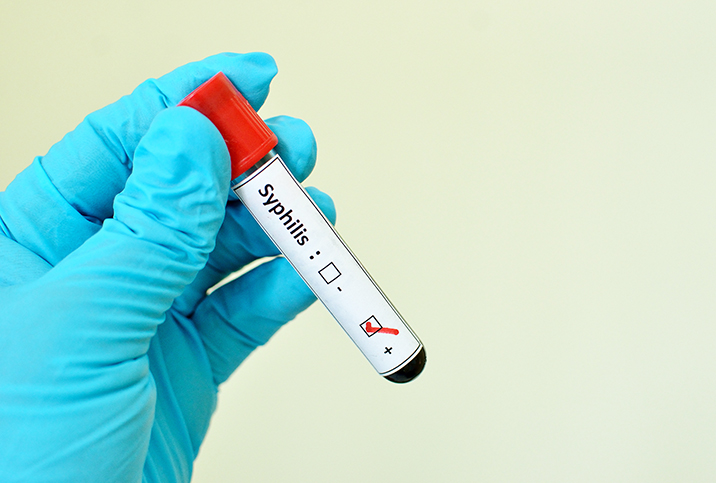The Long-Term Effects of Untreated Syphilis

Syphilis is a relatively rare sexually transmitted disease (STD) in the United States. with almost 130,000 cases reported in 2019, nearly 40,000 of which were in the most infectious stage of the disease.
One of the main problems with syphilis is symptoms in the early stages are minimal and, even if they are detected, could easily be mistaken for less serious maladies. Oftentimes, those issues disappear after a couple of months of their own accord. If you didn't go see a doctor during that period, syphilis moved into a latent period and it might be years before it returns.
The stages of syphilis
Syphilis has four stages: primary, secondary, latent and tertiary.
In the primary stage, you can expect a sore to appear in the part of the body exposed to the disease after a few weeks, most often this is the genital area, notably the penis or vagina. The sores, or multiple sores, may not be painful or even irritating and can be easily unnoticed or ignored. Generally, if left untreated, the sore will eventually disappear of its own accord after a period of six weeks or so.
As syphilis progresses through to the second stage a few weeks after your sore has cleared up, you may notice symptoms such as skin rashes, swollen lymph nodes, sore throat, fatigue, hair loss and weight loss. You may also notice wart-like sores in your mouth and genital area. However, they will go away after several weeks.
Then the disease goes into the third latent stage, where symptoms disappear completely except for the occasional flare-up. Syphilis in this stage can only be detected with a blood test.
Eventually, and this can last as long as 10-30 years, the fourth tertiary stage can set in and lead to severe complications throughout the body.
Here are some of the long-term effects of untreated syphilis and just to note, any damage done to your body before curing the disease will be permanent.
Organ damage
As syphilis makes its way through your body, it can start to attack organs, blood vessels, bones and your heart. If the infection attacks your heart, you may experience a leaky heart valve, a weakened or ruptured aorta, chest pain or a heart attack. Syphilis can also damage the liver and your joints, leading to arthritis.
Paralysis and dementia
If syphilis invades your nervous system, it becomes known as neurosyphilis and can lead to headaches, difficulty moving, paralysis, changed behavior and dementia. Though typically affiliated with late-stage syphilis, neurosyphilis can develop at any stage.
If syphilis begins to affect your brain, you may have a stiff neck and trouble thinking clearly. If it’s affecting your spinal cord, you may experience pain in your limbs and back, plus a loss of feeling in your feet and weak limbs.
Blindness
When syphilis damages your eyes, it is known as ocular syphilis. Ocular syphilis can develop at any stage and can lead to changes in vision or blindness.
Developmental problems
When a woman has syphilis during pregnancy, it can increase the likelihood of a stillbirth or lead to the child's death shortly after birth. Syphilis can also be passed to an unborn baby and result in it becoming developmentally delayed, having seizures or dying—this is known as congenital syphilis. In 2019, the rate of congenital syphilis was 48.5 cases for every 100,000 births.
It’s important for women to have a syphilis screening during the first prenatal appointment to avoid any complications with the baby. Penicillin has a high success rate when used to treat syphilis and can help keep the infection from passing to the child.
Death
Ultimately, syphilis can lead to death if the infection damages organs, the nervous system and other parts of the body. However, death is a rare result of syphilis because, once the disease has been detected, there are simple treatments that can help.
Syphilis is a dangerous disease, but, if detected at an early stage, can easily be cured. It is important to find syphilis early, not only so you can start treatment yourself, but also to halt the disease when it's at its most infectious. That will give you the opportunity to stop passing it on to your sexual partners and also inform them so they can get tested as soon as possible.
To avoid the long-term effects of untreated syphilis, it’s important for you and your sexual partner(s) to get regular screenings and to pay attention to any signs that you may have become infected. Detecting syphilis or any sexually transmitted disease early is always key to successful outcomes. If you suspect you may be infected, make an appointment with your doctor immediately.


















